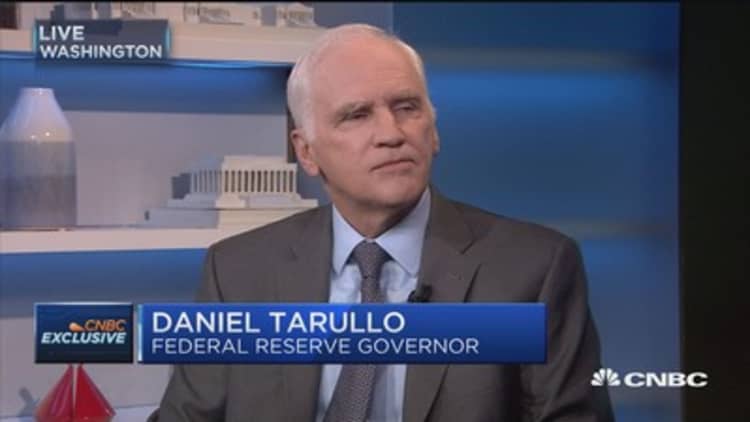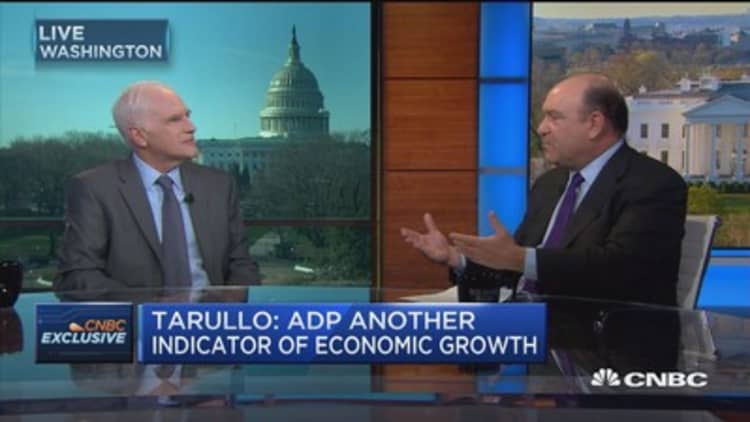
Outgoing Federal Reserve Governor Daniel Tarullo told CNBC on Wednesday that robust March job growth at American companies provides more confirmation of a "solid trend" of strength in employment. He also said the economy is gaining traction.
U.S. companies added 263,000 jobs in March, according to the latest ADP and Moody's Analytics private payrolls report. That was well above the 185,000 expected from economists surveyed by Reuters. The government reports its March employment report on Friday.
Despite a better labor market, the CNBC Rapid Update, which tracks the outlook for economic growth, puts the median gross domestic product estimate for the first quarter at an advance of just 1.2 percent.
"Every year, it does seem as though the Q1 numbers are somewhat lower than people expected," Tarullo acknowledged. "The residual seasonality question continues to linger."
But forward indicators — including numbers on jobs, durable goods orders, and consumer confidence — also bode well for second quarter growth, he said. "There's also a fair chance that Q2 numbers are going to look pretty good."
The next Fed meeting on interest rates is on May 2-3. Central bankers put one rate hike for 2017 on the board at the March meeting. A major debate on Wall Street is whether the Fed increases rates two more or three more times this year.
There's also talk about when the Fed may start to wind down its $4.5 trillion balance sheet, which has swelled over the years through multiple rounds of quantitative easing, bond-buying and other loose-money measures.
It's time to start "in thinking about" a balance sheet reduction, said Tarullo. "The question ... is how one pairs that with interest rate normalization."

The investor optimism that has followed the election for strong economic growth from tax cuts, deregulation, and an Obamacare replacement should be upside considerations, but not factors to build into monetary policy decisions, he said.
"There are a lot of possibilities with respect to the size, the composition, and the timing of any fiscal package," said Tarullo who appeared on "Squawk Box" on his last day at the central bank. The 64-year-old, a tough regulator on the banks, announced his plans to retire in February.
As President Donald Trump and GOP lawmakers seek to wipe regulations off the books, Tarullo said he'd like to see the largest banks hold more rainy day capital. "There's still room, given what we learned about the crisis, for some more capital," he said.
But he added that banks No. 9 to No. 30 in size should be allowed a reduction in capital requirements.
He also advocated a bit of an easing on bank stress tests. "As we already have done for banks with less than $250 billion in assets, we should probably now be thinking about phasing the qualitative side of the stress test."

Tarullo's appearance comes a day after Richmond Fed President Jeffrey Lacker , admitting that in 2012 he discussed sensitive information with an analyst a Medley Global Advisors regarding the central bank's plans at the time for economic stimulus.
Lacker's resignation was negotiated with law enforcement officials, CNBC had learned. No charges will be filed, according to Lacker's attorney.
The episode is a cautionary tale to Fed policymakers to be "very aware of the rules" and not skirt too close to them, Tarullo told CNBC on Wednesday. He dismissed a new Barclays research report on Lacker's resignation which claimed that the episode hurts the credibility of the Fed.
Barclays analyst Michael Gapen wrote, "we view the main effect of .... [Tuesday's] announcement as a significant loss of Fed credibility, which will give ammunition to those who think Fed decisions need greater scrutiny."


